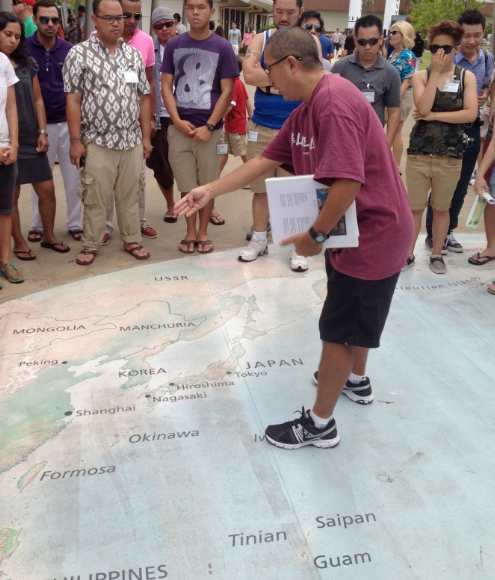
At this year’s National Queer Asian Pacific Islander Alliance’s (NQAPIA) Leadership Summit in Honolulu, HI, API Equality – Northern California‘s staff and interns learned organizing skills and gained more perspective on Pacific Islander needs and issues. We were also able to share our own best practices and knowledge by leading sessions on storytelling, one-on-one relationship building, and radical welcome.
On Friday, July 26th, two buses full of Asian Pacific Islander LGBTQ people and allies embarked on a short tour of Oahu, Hawai’i. We were scheduled to visit two popular destinations–‘Iolani Palace and Pearl Harbor–but we were not there to see museum placards or gift shops. Rather than the typical beaches, war memorials, and “hula girls,” our trip was a “De-Tour” from the colonized, appropriated tourist-destinations that thousands of folks visit every year.
The tour gave participants the opportunity to learn from amazing Hawaiian activists, all knowledgeable about the history of Native peoples and the Hawaiian sovereignty movement. Eyes were opened as we learned more about the history of imperialism on the islands, and the people’s movement that fought against colonizing forces. At ‘Iolani Palace, for example, I was shocked to learn of the Hui Aloha Aina Anti-Annexation Petitions. These petitions were gathered from 1897-1898, and showed the strong will of the Hawaiian people to resist annexation and further colonization by the U.S. The Hui Aloha Aina signatures actually worked to fight annexation, and yet they were rarely (if at all) talked about in any history class that I’ve taken!
Tour participants were further challenged when we embarked on our next stop to Pearl Harbor. The narrative painted in my pre-university education often highlighted “brave American forces,” and “Japanese aggressors.” Native Hawaiians and Pacific Islanders perspectives were not included in these discussions–until now. At each station of the Pearl Harbor exhibit, we examined how external military forces and post-Pearl Harbor racism negatively affected the native community. All of this knowledge worked to agitate and inform summit participants, motivating us to educate ourselves further on the struggles and successes of Native Hawaiian and Pacific Islander communities.

